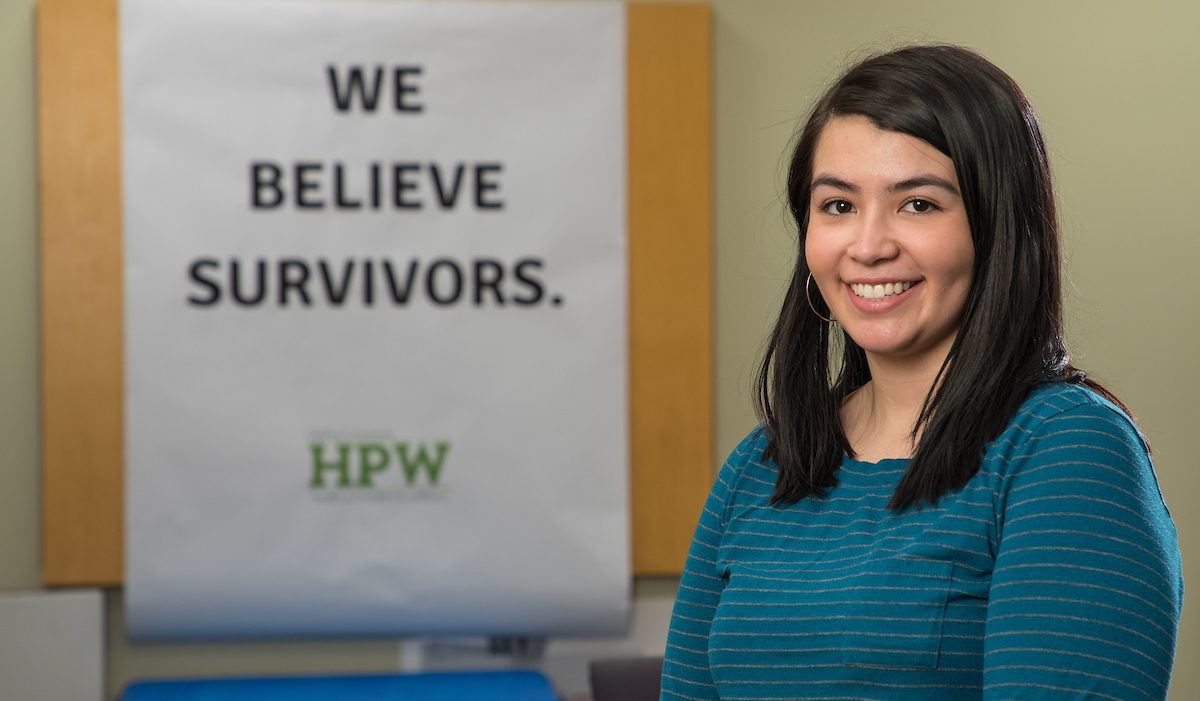 Stevie Rodriguez, a junior in the College of Science and Health, works in the Office of Health Promotion and Wellness. She helps to organize the Take Back the Night event and Sexual Assault Awareness Month. (DePaul University/Jeff Carrion)
Stevie Rodriguez, a junior in the College of Science and Health, works in the Office of Health Promotion and Wellness. She helps to organize the Take Back the Night event and Sexual Assault Awareness Month. (DePaul University/Jeff Carrion)Stevie Rodriguez, a junior health science major with a concentration in public health, is like many typical college students. She started her college career as a bioscience major, but soon began to reconsider her calling. After taking classes in women and gender studies, public health and other social sciences, she developed an interest in the relationship between social inequality, a person's health and quality of life.
Almost two years into studying health sciences and public health, she believes she has found her path by combining her passion for science and her love for helping people. Rodriguez became a peer health educator in the Office of Health Promotion and Wellness at the beginning of her junior year.
"At the end of my second year, I decided to apply for the position at HPW after speaking with my academic advisor," Rodriguez shares. "I hoped to create more roots on campus while also exploring my interests in public health and health education."
She commutes to campus from the West Lawn neighborhood, and had found it was difficult to be truly engaged on campus outside of a structured program like the Health Education Action Team. In winter and spring of 2018, her HEAT role drew her heavily into planning for Sexual Assault Awareness Month. She and another peer health educator developed a comprehensive social media plan that aimed to raise awareness and educate around the issue of sexual and relationship violence.
"We developed posts listing the confidential reporting resources for survivors on campus - University Counseling Services, ordained individuals in University Ministry, attorneys from Student Legal Services and the Office of Health Promotion and Wellness," she says. "We also developed posts to help dispel common myths regarding the perpetrators and survivors of sexual and relationship violence, as well as when and where sexual and relationship violence occurs."
Rodriguez also played a big part in planning the art showcase, "Out Stories Have Power," which took place on the same day as Take Back the Night. Her efforts included integrating art with sexual and relationship violence stories to present themes that offer emotional support and encouragement, such as "Healing is not Linear" which reminds survivors that there is no single or perfect narrative for recovery.
Denim Day, an awareness event that also took place on April 25, was another part of her HEAT responsibilities. The campaign originally was triggered by a Italian Supreme Court ruling in which a rape conviction was overturned because the victim was wearing tight jeans. The justices believe she must have helped her rapist remove them, thereby implying consent. Wearing jeans on Denim Day has become a symbol of protest against the misconceptions that surround sexual assault.
"Speaking out against sexual violence is important because it creates a community of support and care for all those affected," Rodriguez shares. "It can be hard to live in a society that constantly conflates sexual assault with sex through different media outlets and headlines, so distinguishing these two concepts is critical."
Although Rodriguez has been engaged in other roles on campus, her favorite experience at DePaul has been working in the Office of Health Promotion and Wellness as a Peer Health Educator.
"Working with HEAT has allowed me to engage my fellow peers on holistic health and wellness education," she says. Through collaboration with different campus organizations and departments on events and leading presentations and workshops on a variety of topics, she feels she has connected with, supported and educated her peers on significant topics.
Hannah Retzkin, sexual and relationship violence prevention coordinator in the Office of Health Promotion and Wellness says Rodriguez's work has helped other students. She has also seen Rodriguez blossom.
"It has been a joy watching Stevie grow and develop in her role as a peer health educator. Her work and dedication to Take Back the Night will benefit the DePaul community for years to come," she says.
Rodriguez is particularly proud of Take Back the Night. The program grew this year to be a collaboration between The Women's Center, The Office of Multicultural Student Success, Fraternity and Sorority Life, The Office of Health Promotion and Wellness, Residential Education, Advocating for Sexual Assault Prevention, and Students for Reproductive Justice.
"Having multiple organizations and departments step forward to plan Take Back the Night has helped reach a broader audience," Rodriguez says. "This allowed for greater student participation and leadership."